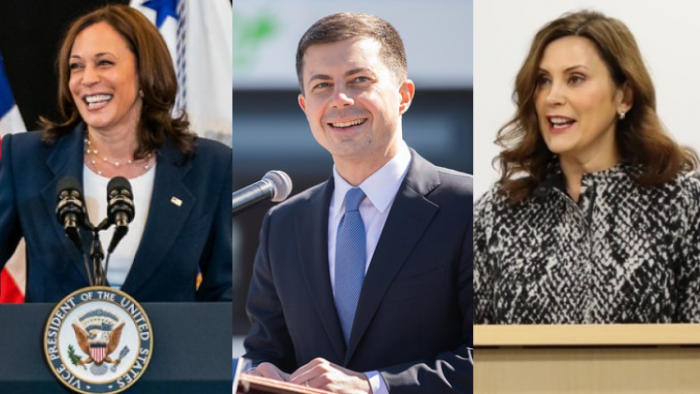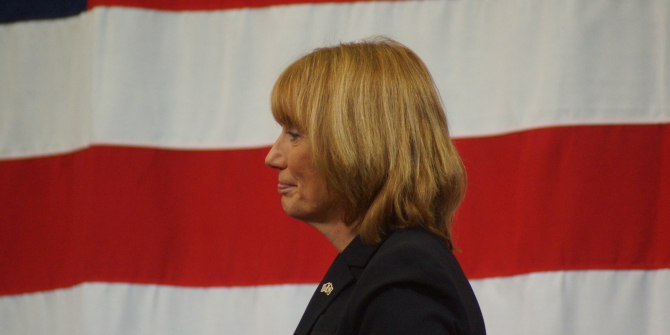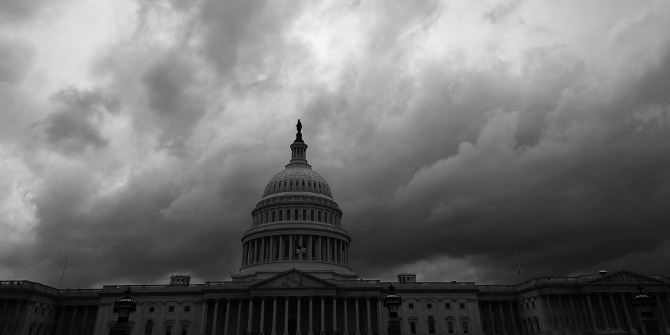 With the 2022 midterms behind us and uncertainty over whether Joe Biden will run for a second presidential term, Caroline Leicht takes a close look at the rising political stars of the Democratic Party: Vice President Kamala Harris, Secretary of Transportation Pete Buttigieg, and Michigan Governor Gretchen Whitmer. If Biden decides not to run, then the 2024 Democratic presidential primaries could be an interesting race.
With the 2022 midterms behind us and uncertainty over whether Joe Biden will run for a second presidential term, Caroline Leicht takes a close look at the rising political stars of the Democratic Party: Vice President Kamala Harris, Secretary of Transportation Pete Buttigieg, and Michigan Governor Gretchen Whitmer. If Biden decides not to run, then the 2024 Democratic presidential primaries could be an interesting race.
Historically, the midterms pose a challenge for the incumbent president, and it was no different for Joe Biden in 2022. His low approval ratings caused Democrats to fear a Republican Red Wave last November. But such a wave did not sweep the nation. Instead, Biden’s Democrats did far better than expected, retaining control of the Senate. But the initial enthusiasm post-midterms may not carry over to 2024.
Biden faces significant challenges
Despite unexpected successes, the results of the midterms pose significant challenges to Biden and his administration’s agenda going forward. With Republicans winning control of the House, Biden’s more liberal campaign promises are unlikely to make it through Congress, which could hurt his standing with voters.
The president’s relationship with the American electorate is already on thin ice. Even an initial post-midterms boost has not helped to keep Biden from his ongoing approval ratings low, which have been around 42 percent in recent months. With news of classified documents found in his Delaware home and calls from within the party for Biden to make way for a younger candidate in the 2024 presidential election, Biden’s “intention” to stand for re-election may not hold up after all.
If Biden decides not to run, Democrats have several other options, particularly as the midterms proved to be a catapult for potential 2024 candidates. Three names that are frequently mentioned now are Vice President Kamala Harris, Secretary of Transportation Pete Buttigieg, and Michigan Governor Gretchen Whitmer.
Kamala Harris: The obvious second choice?
As Vice President, Kamala Harris would certainly be the obvious second choice. But the former Senator from California is doing poorly in approval ratings as well. In early February, only 39 percent of Americans said they had a favorable view of her. Harris’ approval rating appears to be linked to Biden, an observation that should come as no surprise. Research suggests that favorability and job approval of vice presidents is consistently linked to presidents as most citizens do not form “independent opinions” about vice presidents.
If Biden does not run, Harris would have the opportunity to set her agenda and portfolio, step out from Biden’s shadow and have voters form independent opinions about her, a process that would almost certainly change current polling patterns. As the incumbent vice president, however, Harris would face the challenge of balancing setting herself apart from Biden and not diminishing their administration’s efforts.
And this may not be the only challenge for Harris. If New Hampshire persists with holding the first primary despite the Democratic National Committee’s disapproval, Harris could have quite negative first primary numbers. In January, the Granite State Poll in New Hampshire had her polling at just two percent, significantly behind six other Democratic hopefuls. The proposed move to holding the first primary in South Carolina, on the other hand, could be beneficial for Harris. In the Southern state, she is currently comfortably ahead of potential challengers and enjoys particularly high popularity among Black and Hispanic voters who make up a large share of the South Carolina electorate.
Beyond the primaries, however, Harris would need to do significantly better among other demographic groups to gain the Electoral College victory. She is currently not performing well among White voters and only does well with voters who have completed a postgraduate education.
Pete Buttigieg: From mayor to president?
If Harris decides to run, she would be unlikely to run unopposed in the primaries. One potential challenger could also come from within the current administration: Transport Secretary Pete Buttigieg is seen as a rising star among Democrats and may throw his hat in the ring if Biden decides not to run. Until his first presidential run in 2020, Buttigieg was the mayor of South Bend, Indiana, a town with a population of just over 100,000 people.
His 2020 presidential bid gained him much national attention, particularly when he won the Iowa Caucuses. However, Buttigieg suspended his campaign shortly after the South Carolina primary where he picked up no delegates. He has previously had difficulties securing support from minority voter groups. If South Carolina now becomes the first primary contest in the calendar, this could pose significant challenges to Buttigieg’s aspirations.
Since his move to Washington in January 2021, Buttigieg has continued to make a name for himself on the national stage. He has gained praise for presenting himself in a smart and well-spoken way, particularly in live interview situations. Ahead of the midterms, Buttigieg was “the most requested surrogate on the campaign trail” which not only speaks to his popularity within the Democratic Party but also provided an opportunity for him to further raise his public profile across the nation.
Indeed, his name recognition has increased since the midterms and he is consistently polling among the top two or three in national and early state polls. At the end of January, the New Hampshire Granite State Poll showed him in first place, even leading Biden. While it is highly unlikely that Buttigieg would run in the primaries if Biden does, these numbers do suggest that the former mayor enjoys significant popularity among the electorate.

“V20210703CS-1698” by The White House is United States government work, “Increasing Access to Clean Transit Optio” (Public Domain) by Governor John Carney, “Governor Whitmer” (CC BY-NC 2.0) by Michigan National Guard
Gretchen Whitmer: The wild card favorite?
In addition to the two almost obvious options, Harris and Buttigieg, there may also be a potential wild card on the horizon after the midterms. Gretchen Whitmer, who was a rumored finalist to be Biden’s running mate in 2020 and was the target of a state-based kidnapping plot thwarted by the FBI in October of the same year, has become a rising political star in the Democratic Party. The Michigan Governor just won a second term in the midterms, defeating Trump-backed Republican Tudor Dixon by 10.6 percentage points, a higher margin than her first win in 2018.
Unlike Buttigieg, Whitmer did not have an Ivy League education; she attended university in her home state of Michigan and began her political career there in 2000. She was the first female Democratic leader of the Michigan Senate, and in 2013 gained national attention for her passionate speech on abortion rights, revealing that she had been sexually assaulted as a young woman. Whitmer has been a leading voice among Democrats on this vital healthcare issue, particularly in the aftermath of the Supreme Court’s decision to overturn Roe v Wade.
Ahead of the midterms, she received the endorsement of a coalition of over 150 Michigan Republicans, a testament to her ability to work across the aisle. In their endorsement, the coalition of Republicans praised Whitmer for having passed 900 bipartisan bills during her time as governor, an attribute that could certainly help her in securing support on a presidential run as well.
With Democrats’ wide success in Michigan at the midterms, Whitmer has received increased attention. Within the party, she has already been making a name for herself; she was selected to give the Democratic response to the 2020 State of the Union address and has been a vice chair of the Democratic National Committee since 2021.
And while an early November poll saw only 13 percent of voters saying they would want her to run for the White House and three percent that she would be their top choice, Whitmer should not be ruled out as a wild card favorite for a potential Democratic primary contest after her success in the midterms. Likely voters in New Hampshire, for instance, have a more favorable view of Whitmer than they do of Kamala Harris according to the latest Granite State Poll. Additionally, with Michigan poised to move into an earlier primary slot in 2024, Whitmer could have an early home advantage if she decides to run.
Democratic primaries could become the race to watch
As Biden’s challenges prevail, the Democratic Party must at least consider alternative candidates for 2024. While Harris as the vice president may be the obvious choice to step up, she faces many of the same challenges the president does: Low approval ratings and difficulties delivering on key voting issues while Republicans control the House.
But the midterms have not only created challenges for Democrats; they have also fostered opportunity. Buttigieg’s many appearances on the campaign trail across the nation have not only raised his public profile but have also been very telling of the support he enjoys within the Democratic Party. And Michigan Governor Gretchen Whitmer, with the successes across her home state in her corner, has certainly claimed her status as a serious challenger in a potential 2024 Democratic primary as well.
Other potential candidates could be Senators Elizabeth Warren and Amy Klobuchar, or California Governor Gavin Newsom; however, like Harris, Buttigieg and Whitmer, they have all declined to comment on any potential 2024 aspirations. It will be up to whether Biden runs or not. If he does not, Democrats certainly have options now and the primaries could shape up to be an interesting race, particularly with the added variable of a change in the primary calendar.
- This blog is an adaptation of Caroline Leicht’s chapter “Rising Stars and Fading Stars: Challenges and Opportunities for the Democratic Party After the Midterms” published on 30 January 2023 in a briefing paper on the 2022 US Midterms. Titled “Exploring the 2022 US Midterms,” the briefing paper was published by the PSA American Politics Group and consists of eight chapters analyzing aspects of American politics in relation to the 2022 Midterms. The full brief is available on the PSA APG website.
- Please read our comments policy before commenting.
- Note: This article gives the views of the author, and not the position of USAPP – American Politics and Policy, nor the London School of Economics.
- Shortened URL for this post: https://bit.ly/3JOyjI9







Look past the glaringly obvious when talking American politics. Kentucky Governor Andy Beshear, assuming he prevails this November, will likely be a top contender for 2028. The most popular Democratic governor in the country (in one of the most conservative states), incredibly young, battle tested after winning as a Dem attorney general and now Governor. He hasn’t sacrificed potential coastal liberals while being able to maintain 50% approval amongst Republicans is a testament to his leadership during COVID, tornadoes, floods and bringing the state’s economy from bottom to the top.